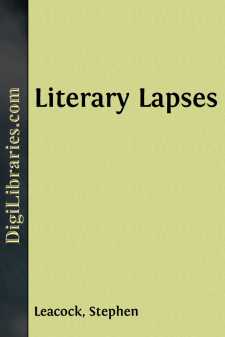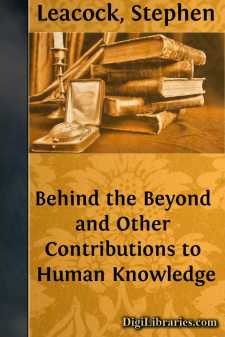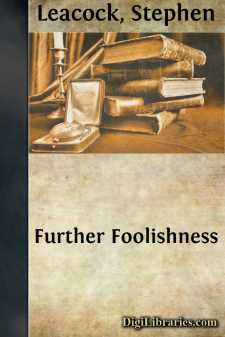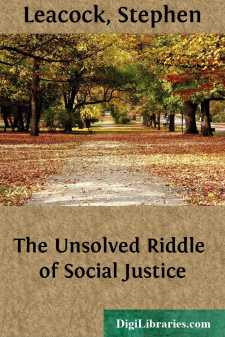Categories
- Antiques & Collectibles 13
- Architecture 36
- Art 48
- Bibles 22
- Biography & Autobiography 813
- Body, Mind & Spirit 142
- Business & Economics 28
- Children's Books 15
- Children's Fiction 12
- Computers 4
- Cooking 94
- Crafts & Hobbies 4
- Drama 346
- Education 46
- Family & Relationships 57
- Fiction 11828
- Games 19
- Gardening 17
- Health & Fitness 34
- History 1377
- House & Home 1
- Humor 147
- Juvenile Fiction 1873
- Juvenile Nonfiction 202
- Language Arts & Disciplines 88
- Law 16
- Literary Collections 686
- Literary Criticism 179
- Mathematics 13
- Medical 41
- Music 40
- Nature 179
- Non-Classifiable 1768
- Performing Arts 7
- Periodicals 1453
- Philosophy 64
- Photography 2
- Poetry 896
- Political Science 203
- Psychology 42
- Reference 154
- Religion 513
- Science 126
- Self-Help 84
- Social Science 81
- Sports & Recreation 34
- Study Aids 3
- Technology & Engineering 59
- Transportation 23
- Travel 463
- True Crime 29
Literary Lapses
by: Stephen Leacock
Description:
Excerpt
LITERARY LAPSES
My Financial Career
When I go into a bank I get rattled. The clerks rattle me; the wickets rattle me; the sight of the money rattles me; everything rattles me.
The moment I cross the threshold of a bank and attempt to transact business there, I become an irresponsible idiot.
I knew this beforehand, but my salary had been raised to fifty dollars a month and I felt that the bank was the only place for it.
So I shambled in and looked timidly round at the clerks. I had an idea that a person about to open an account must needs consult the manager.
I went up to a wicket marked "Accountant." The accountant was a tall, cool devil. The very sight of him rattled me. My voice was sepulchral.
"Can I see the manager?" I said, and added solemnly, "alone." I don't know why I said "alone."
"Certainly," said the accountant, and fetched him.
The manager was a grave, calm man. I held my fifty-six dollars clutched in a crumpled ball in my pocket.
"Are you the manager?" I said. God knows I didn't doubt it.
"Yes," he said.
"Can I see you," I asked, "alone?" I didn't want to say "alone" again, but without it the thing seemed self-evident.
The manager looked at me in some alarm. He felt that I had an awful secret to reveal.
"Come in here," he said, and led the way to a private room. He turned the key in the lock.
"We are safe from interruption here," he said; "sit down."
We both sat down and looked at each other. I found no voice to speak.
"You are one of Pinkerton's men, I presume," he said.
He had gathered from my mysterious manner that I was a detective. I knew what he was thinking, and it made me worse.
"No, not from Pinkerton's," I said, seeming to imply that
I came from a rival agency.
"To tell the truth," I went on, as if I had been prompted to lie about it, "I am not a detective at all. I have come to open an account. I intend to keep all my money in this bank."
The manager looked relieved but still serious; he concluded now that I was a son of Baron Rothschild or a young Gould.
"A large account, I suppose," he said.
"Fairly large," I whispered. "I propose to deposit fifty-six dollars now and fifty dollars a month regularly."
The manager got up and opened the door. He called to the accountant.
"Mr. Montgomery," he said unkindly loud, "this gentleman is opening an account, he will deposit fifty-six dollars. Good morning."
I rose.
A big iron door stood open at the side of the room.
"Good morning," I said, and stepped into the safe.
"Come out," said the manager coldly, and showed me the other way.
I went up to the accountant's wicket and poked the ball of money at him with a quick convulsive movement as if I were doing a conjuring trick.
My face was ghastly pale.
"Here," I said, "deposit it." The tone of the words seemed to mean, "Let us do this painful thing while the fit is on us."
He took the money and gave it to another clerk.
He made me write the sum on a slip and sign my name in a book. I no longer knew what I was doing. The bank swam before my eyes.
"Is it deposited?" I asked in a hollow, vibrating voice....












